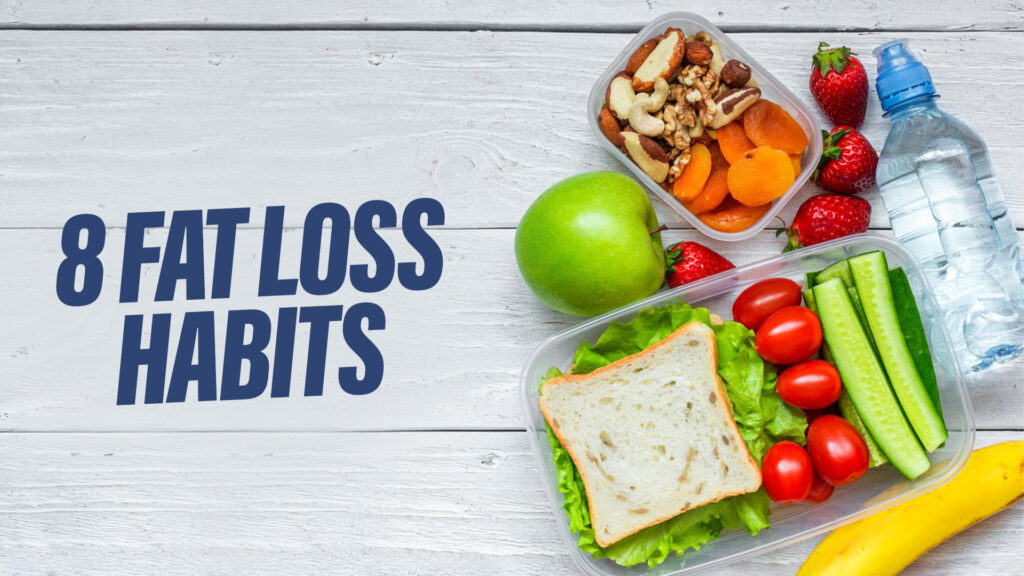TOP 8 DAILY FAT LOSS HABITS

Losing fat isn’t just about dieting and training hard; it’s about carefully building a lifestyle that supports lasting results. While the end goal might seem daunting, the journey doesn’t have to be overwhelming. The key is to take small steps and turn them into sustainable habits that become second nature. When starting your fat loss journey, the internet can overwhelm you with countless tips and strategies. But don’t worry—losing fat isn’t an impossible mission if you start it right. If you want to feel healthier and more energized but don’t know where to start, here is a set of small habits that can significantly improve your health and fitness. Imagine your habits as building blocks—you wouldn’t try to construct a whole house at once, would you? The same goes for your health. Follow a step-by-step strategy and believe in the process so you can achieve your health goals by picking one habit at a time. Let’s explore a simple yet powerful principle: “The Power of Tiny Steps” Start by choosing one habit from the list below and committing to it for the next 14 days. Think of it as a mini-challenge. Once you’ve made that habit part of your lifestyle, move on to the next one and stick with it as you did the first. This approach helps you avoid feeling burdened, and each habit becomes firmly rooted in your routine. Here’s the order I follow, but feel free to pick what works best for you. 1. Sips Over Scrolls (Drink 3-4 Liters of Water a Day) Keep your water bottle close, just like you do with your phone, and take sips regularly throughout the day. Using a bottle helps you monitor your intake, keeping you hydrated and refreshed. When you can see how much water you’re drinking, it not only keeps you motivated but also supports your overall well-being. Make water your go-to drink whenever possible. Always choose it over sugary beverages like soda or juice, which are loaded with simple sugars and extra calories. Water is essential for countless bodily functions, including digestion and nutrient absorption. Staying hydrated can also curb cravings and keep you feeling fuller for longer. Try to drink at least 3 to 4 liters of water every day. 2. Sweet and Sound Sleep, Not Endless Streams Rest is your body’s reset button. Adequate sleep regulates hormones that influence hunger and metabolism. Sleep is as essential as eating, drinking, and breathing. Circadian rhythms, our natural body clocks, work with light and darkness to tell us when to sleep, wake up, and eat. We often spend our best hours of sleep in front of screens or binge-watching Netflix, which might not seem harmful right now but could damage your health in the long term. Following circadian rhythm helps us stay healthy, feel more energetic, and improve our mood. it’s important to limit screen time, especially before bed. During sleep, your body undergoes various processes and stages that help maintain healthy brain function and physical health. Not getting proper sleep can lead to problems such as poor mental health, low recovery, fatigue, and lower academic and work performance. Get 7-9 hours of quality sleep each night, including naps during the day if needed. 3. Go Lean with Protein Try to add a portion of protein to every meal. Examples of good sources of protein are chicken, beef, mutton, fish, eggs, cottage, etc. Protein is a super important macronutrient: it builds muscle, helps balance hormones, stabilizes appetite, controls sugar cravings, improves bone health, strengthens hair, nails, and skin, and improves brain health. Only adding protein to every meal will improve food cravings, blood sugar imbalances in the immune system, and symptoms of fatigue and weakness. 4. Greens Over Grains in Every Meal Make vegetables your new go-to option in your meals as they’re packed with nutrients and fiber, keeping you satisfied without adding extra calories. Swapping grains for veggies at every meal is a simple change that can transform your diet and life. A plate full of colorful, delicious vegetables is packed with essential vitamins, minerals, and fiber. This not only creates a nutrient-dense foundation for your meals but also boosts your immune system, aids digestion, and potentially reduces your risk of chronic diseases. Think about how great it feels when your blood sugar levels are steady and you’re not constantly hungry. The high fiber in vegetables can help control blood sugar levels and boost a sense of fullness, which supports your weight management goals. 5. Four Cups a Day, the Veggie Way We discussed earlier that we should use more vegetables and fewer grains. But how much more is enough for a day? To make sure you’re getting enough vegetables, make it a habit to add at least four 1-cup servings to your daily diet. This easy goal helps you meet your nutritional needs and keeps your meals balanced. Vegetables are a great source of nutrients, low in calories and fat, with complex carbohydrates that provide energy without causing blood sugar spikes. Whether it’s a cup of mixed greens with lunch, a side of steamed broccoli at dinner, or even some raw carrots for a snack, just keep track of those servings throughout the day. It’s an easy way to boost your health and add variety to your meals. 6. Listen to Your Body, Not Your Plate Listen to your body’s hunger cues. Instead of stuffing yourself, stop eating before you feel completely full. This mindful approach helps you avoid overeating and connect with your body’s natural signals of hunger and fullness. Here is a tip: if you do not know when to stop eating. Look at your plate, decide how much you might need to feel full, and then assess what 80% of that amount of food would look like. Then eat that amount. You will feel satisfied and not hungry anymore. This habit helps you enjoy your meal and feel satisfied without the discomfort of overeating. 7. Strength Training For Strong Body Strength training


